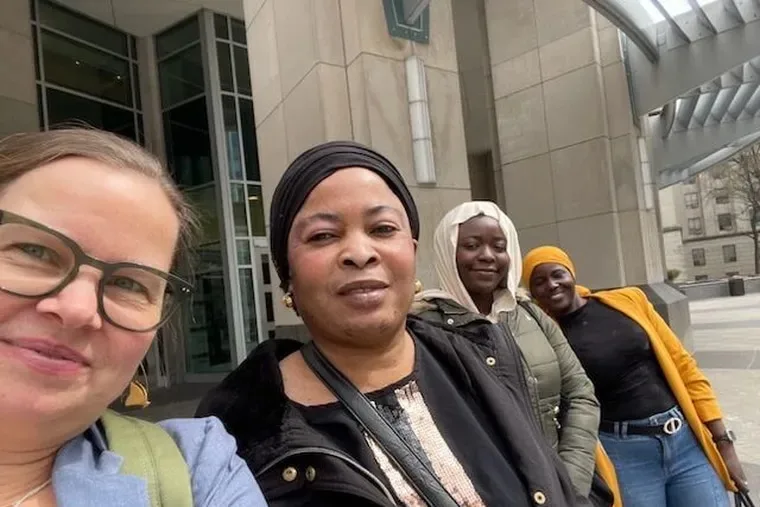
When Maimouna Thiam was a girl in Senegal, her mother immersed her in the craft of natural hair braiding.
When she immigrated to the United States in 1993, it became the skill she used to provide for her family. With demand for natural hair braiding booming — about four out of 10 African American women preferring — natural hair, Thiam was ultimately able to purchase the Olney salon where she had worked for years.
It was the American dream come true.
Except, she would come to learn, it was all illegal.
From crisis to celebration
That all changed on July 25, when a Commonwealth Court panel declared that the state’s licensing requirements violated Thiam’s Pennsylvania constitutional right to make a living with requirements that were unreasonable.
Thiam started braiding hair years before it was regulated, and after years of fighting the state, she is now free to practice her craft without concerns that her shop will be shuttered.
But the good news has been a long time coming.
In 2006, the state amended the Cosmetology Law requiring hair braiders to take 1,250 hours of instruction and an examination in order to get a license.
Later, after complaints of burdensome regulations, the state modified the requirements and created a limited hair braiding license that mandated 300 hours of hair braiding instruction from a licensed school of cosmetology, and that the person be at least 16 years old and have a 10th-grade education or equivalent.
Thiam, who had licenses from other states, attempted to comply but between personal illness and a lack of places providing natural hair braiding instruction, she wasn’t able to obtain a license in Pennsylvania.
“It could be a way to overcome all the obstacles [for all braiders].”
And because she did not have a license, Thiam started receiving cease-and-desist letters for her shop in 2011.
According to the State Board of Cosmetology, she would need to either shutter the business, find a licensed salon manager, or get licensed herself.
“She first came to us in 2018 because she had received paperwork that she didn’t understand,” said Nadia Hewka, Community Legal Services supervising sttorney. Currently, Thiam is in West Africa visiting a sick relative, but when she returns, Hewka said, they plan to have “a celebration.”
Instruction is always in English, and for Thiam, who is fluent in Wolof and French and speaks limited English, that has been one of her most significant barriers in getting a license.
And the examination for cosmetologists, aestheticians, and nail technicians is offered in several languages — Spanish, Chinese, Korean, Vietnamese. Even though many braiders are from West Africa or the Caribbean, where languages like Wolof, French, and Creole are spoken, the natural hair braider test is only offered in English.
Eric Edi, the chief operating officer of the Coalition of African Communities in Philadelphia (AFRICOM), said although Thiam’s constitutional win impacted only her business, it signaled for the hair braiding community that “Hope is on the way. This is a case of jurisprudence that will inform other potential cases.”
The troublesome question at the root
Is natural hair braiding even part of the practice of cosmetology? Or is it a completely different hair craft? For almost three decades that controversy has been debated in state legislatures across the country.
In Pennsylvania, the state Bureau of Professional and Occupational Affairs and state Board of Cosmetology, which enforces cosmetology codes written in 1933, has consistently argued that natural hair braiding is a part of cosmetology, and that their enforcement of the codes is a matter of protecting the public’s health and safety.
» READ MORE: It’s almost 2023. Black people shouldn’t still feel pressure to change their hair.
But natural hair braiding doesn’t use dyes, chemicals, or heated equipment, the tools of the traditional hair trade that are most likely to cause harm. Instead, braiders call the licensing unnecessary, the traditional cosmetology class work irrelevant, and the school tuition, which can top thousands of dollars, expensive.
A 2018 report from then-Gov. Tom Wolf advocating de-licensing several occupations including hair braiding showed that 75% of disciplinary sanctions involve five of the state’s 29 boards: nursing; cosmetology; medicine;barber examiners; and vehicle manufacturers, dealers, and salespersons. And the most common violation was practicing without a license.
Fighting the cosmetology code
The case, which Hewka argued in April, was heard by a three-judge panel that had to balance the state’s interest in public safety against Thiam’s constitutional right to make a living.
Writing for the majority, President Judge Renée Cohn Jubelirer called the 300 hours of training and the English skills examination “unduly burdensome.”
In 1992, Taalib-Din Abdul Uqdah v. District of Columbia, was one of the first successful court challenges of cosmetology codes. Uqdah was a co-owner of a natural braiding salon in Washington. “This issue is about race, control, politics and power,” Uqdah once told Village Voice.
The Institute for Justice, a nonprofit, public-interest law firm that has called hair braiding “one of the most dramatic examples of excessive licensing,” sent a letter of support for Thiam stating occupational licensing laws “have gone too far and are, in too many instances, denying Americans the opportunity to earn an honest living without any benefit to consumers. ”
The court win has cemented Thiam’s position as the face of Philadelphia’s natural hair braiding community in the battle to deregulate natural hair braiding across the country.
“It is certainly a win for Ms. Thiam and it might move the ball [on deregulation] forward. It could be a way to overcome all the obstacles [for all braiders],” Hewka said.

